No products in the cart.
We deliver to:
🇦🇺 Australia
🇨🇦 Canada
🇨🇿 Czechia
🇩🇰 Denmark🇪🇪 Estonia
🇮🇪 Ireland
🇮🇱 Israel
🇮🇹 Italy
🇯🇵 Japan
🇲🇽 Mexico
🇵🇱 Poland
🇰🇷 South Korea
🇨🇭 Switzerland
🇬🇧 United Kingdom
🇺🇸 United States of Americaand more
We deliver to:
🇦🇺 Australia
🇨🇦 Canada
🇨🇿 Czechia
🇩🇰 Denmark🇪🇪 Estonia
🇮🇪 Ireland
🇮🇱 Israel
🇮🇹 Italy
🇯🇵 Japan
🇲🇽 Mexico
🇵🇱 Poland
🇰🇷 South Korea
🇨🇭 Switzerland
🇬🇧 United Kingdom
🇺🇸 United States of Americaand more
[category_image]
Ermital 10,000 capsules, gastro-resistant, hard, 10,000 units, bottle 50 pcs.
$33.99
Ermital – pancreatin capsules for pancreatic enzyme replacement in exocrine insufficiency (cystic fibrosis, pancreatitis, surgery). 10 000–36 000 IU.
Category: Gastrointestinal tract and liver
Brand: Nordmark Arzneimittel
Pharmacological properties
Pharmacodynamics. The drug contains pancreatin from the pancreas of pigs in the form of enteric-coated (acid-stable) microtablets in gelatin capsules. The capsules dissolve quickly in the stomach, releasing microtablets according to the multidose principle, which ensures good mixing with the contents of the stomach, transportation from the stomach together with its contents and, after release, sufficient distribution of enzymes within the intestinal contents. When the microtablets enter the small intestine, the shell dissolves quickly (at pH 5.5), releasing enzymes with lipolytic, amylolytic and proteolytic activity, which ensures the breakdown of fats, carbohydrates and proteins. The products of pancreatic digestion are then absorbed either immediately or after further hydrolysis by intestinal enzymes.
Pharmacokinetics. Animal studies have not shown any evidence of absorption of the enzymes in their unchanged form, and therefore classical pharmacokinetic studies have not been performed. Pancreatic enzyme supplements do not require absorption to achieve their effect. On the contrary, their full therapeutic effect is manifested in the lumen of the gastrointestinal tract. Moreover, as proteins, they undergo proteolytic digestion as they pass through the gastrointestinal tract before being absorbed as peptides and amino acids.
Preclinical data do not indicate relevant acute, subchronic or chronic toxicity. No genotoxicity, carcinogenicity or reproductive toxicity studies have been conducted.
Indication
Insufficiency of exocrine pancreatic function in adults and children is caused by various diseases, including the following:
- cystic fibrosis;
- chronic pancreatitis;
- pancreatectomy;
- gastrectomy;
- pancreatic cancer;
- operations with the imposition of a gastrointestinal anastomosis (for example, Billroth II gastroenterostomy);
- Schwachman-Diamond syndrome;
- condition after an attack of acute pancreatitis and the resumption of enteral or oral nutrition.
Application
The dosage of the drug is based on the individual needs of the patient and depends on the degree of digestive disorders and the composition of the food. To select an adequate individual dose, there are three doses of the drug – Ermital 10,000, Ermital 25,000, Ermital 36,000. It is recommended to take the drug during or immediately after a meal. Capsules and microtablets should be swallowed whole, without breaking or chewing, and washed down with a sufficient amount of liquid or taken with a light snack. If the capsule cannot be swallowed whole (children and the elderly), it can be opened and the microtablets added to liquid food that does not require chewing, for example, to applesauce, a liquid with a neutral or slightly acidic environment (yogurt, grated apple). Such a mixture should be taken immediately and not stored.
During treatment with Ermital 10,000, Ermital 25,000, Ermital 36,000, it is very important to drink enough fluids, especially during periods of increased fluid loss. Fluid deficiency can worsen constipation.
Dosage in cystic fibrosis. Based on the recommendations of the Cystic Fibrosis Consensus Conference, case-control studies of the Cystic Fibrosis Association of the United States, and case-control studies in the United Kingdom, the following general recommendations for pancreatic enzyme replacement therapy can be proposed.
The initial dose for children under 4 years of age is 1000 lipase units/kg body weight at each meal and for children over 4 years of age, 500 lipase units/kg body weight at each meal.
The dose should be selected individually, depending on the severity of the disease, control of steatorrhea and maintenance of adequate nutritional status.
The maintenance dose for most patients should not exceed 10,000 U of lipase/kg/day or 4,000 U of lipase per 1 g of fat consumed.
Dosage in other types of exocrine pancreatic insufficiency. The dose should be selected individually, depending on the degree of digestive disorders and the fat content of the food.
The initial dose is 10,000 to 25,000 IU of lipase with each main meal. However, it is possible that some patients may require higher doses to eliminate steatorrhea and maintain adequate nutritional status. According to generally accepted clinical practice, a minimum of 20,000 to 50,000 IU of lipase should be taken with meals. The dose for administration during main meals (breakfast, lunch or dinner) can be 25,000 to 80,000 IU of lipase, and with additional light meals between main meals it should be half the individual dose.
Contraindication
Hypersensitivity to the active substance or any other component of the drug.
Side effects
When studying the effects of pancreatin-containing drugs on patients, the most frequently reported adverse reactions were gastrointestinal, mostly mild to moderate in severity.
Adverse reactions observed during the study of the drug are listed below.
Gastrointestinal: abdominal pain (gastrointestinal disorders were mainly associated with the underlying disease), nausea, vomiting, constipation, bloating, diarrhea, narrowing of the ileocecal section of the intestine and colon (fibrosing colonopathy).
Skin and subcutaneous tissue disorders: rash, itching, urticaria.
Immune system disorders: hypersensitivity (anaphylactic reactions).
Narrowing of the ileocecal part of the intestine and colon (fibrosing colonopathy) has been reported in patients with cystic fibrosis who have taken high doses of pancreatin preparations (see Precautions).
Most allergic reactions, both cutaneous and non-cutaneous, have been identified as adverse reactions during post-marketing use.
Children: No specific adverse reactions have been identified in children. The type and severity of adverse reactions in children with cystic fibrosis were similar to those in adults.
Special instructions
Narrowing of the ileocecal section of the intestine and colon (fibrosing colonopathy) has been observed in patients with cystic fibrosis who were taking high doses of pancreatin preparations.
As a precautionary measure, it is recommended that in case of unusual abdominal symptoms or a change in the nature of abdominal symptoms, medical advice be sought to exclude the possibility of fibrosing colonopathy, especially if the patient is taking more than 10,000 IU of lipase/kg/day.
Like other porcine pancreatin preparations currently on the market, Ermital 10,000, Ermital 25,000, Ermital 36,000 are produced from pancreatic tissue of pigs intended for food purposes. Although the risk of the drug entering the human body with an infectious agent is reduced by testing and inactivation of certain viruses during the manufacturing process, there is a theoretical risk of transmission of viral infections, including those caused by new or unidentified viruses. The presence of porcine viruses that can affect humans cannot be completely ruled out.
However, there has not yet been a single case of transmission of an infectious disease due to the use of porcine pancreatin preparations, although they have been used for a long time.
The drug should be used with caution in patients with renal failure, hyperuricemia, and patients with allergies to proteins of pork origin.
Use during pregnancy and breastfeeding. Due to the lack of clinical data on the effect of pancreatic enzymes on the course of pregnancy, the drug should be prescribed with caution to pregnant women. Animal studies have shown no signs of absorption of pancreatic enzymes. Thus, the possibility of toxic effects on reproduction and fetal development is not expected.
Since animal studies indicate no systemic exposure of the breast-feeding woman to pancreatic enzymes, no effects on the breast-fed infant are anticipated. Therefore, there are no contraindications to the use of pancreatic enzymes during breast-feeding.
If necessary, pregnant or breastfeeding women can take the drug in doses sufficient to ensure adequate nutritional status.
Children. Used in pediatric practice.
Ability to influence the reaction rate when driving vehicles or working with other mechanisms. The drug has no or negligible effect on the ability to drive vehicles or work with other mechanisms.
Interactions
Interaction studies have not been conducted.
Overdose
Cases of hyperuricosuria and hyperuricemia have been reported in association with the administration of very high doses of pancreatin.
Storage conditions
At a temperature not exceeding 25 °C.
Be the first to review “Ermital 10,000 capsules, gastro-resistant, hard, 10,000 units, bottle 50 pcs.” Cancel reply
You may also like


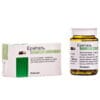

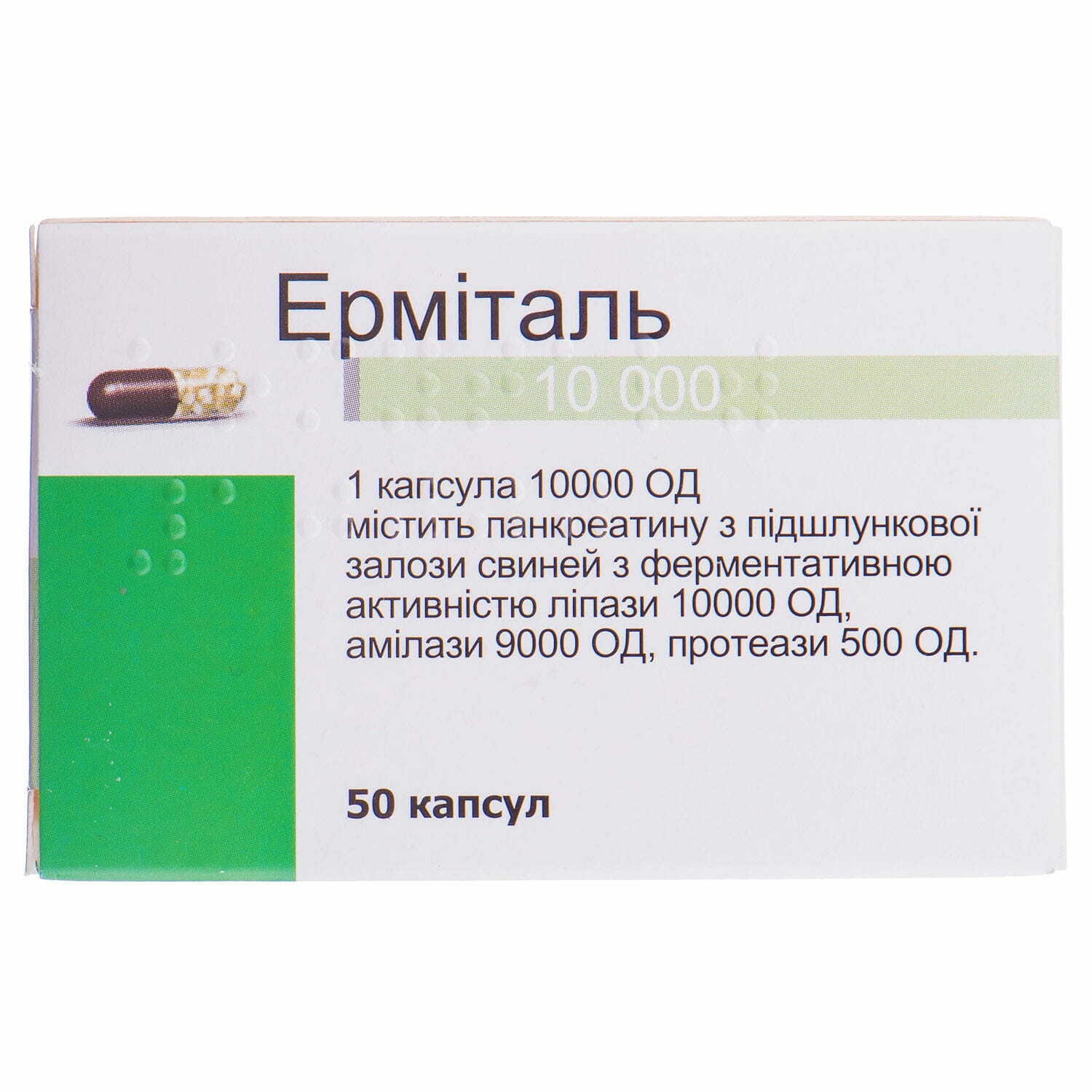
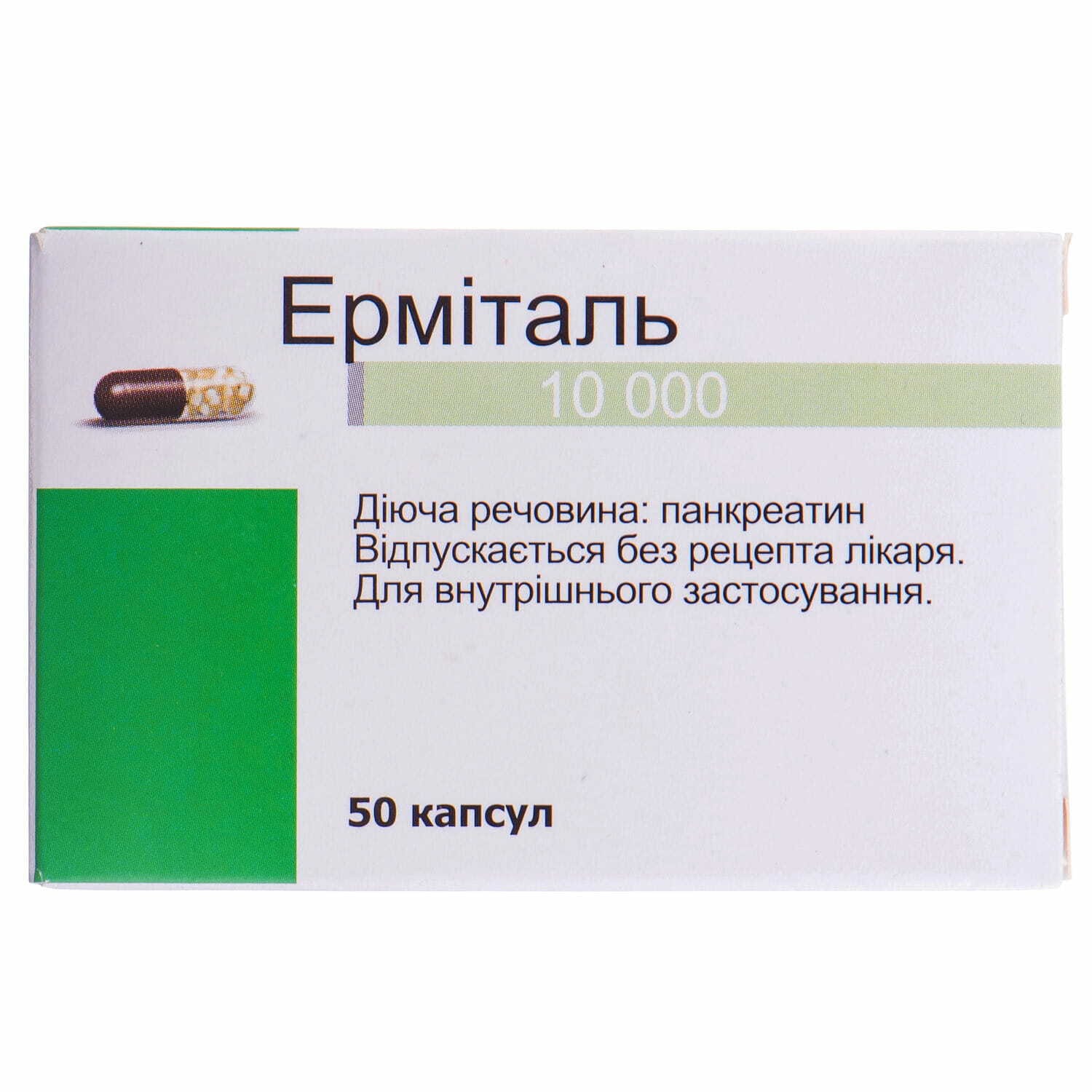
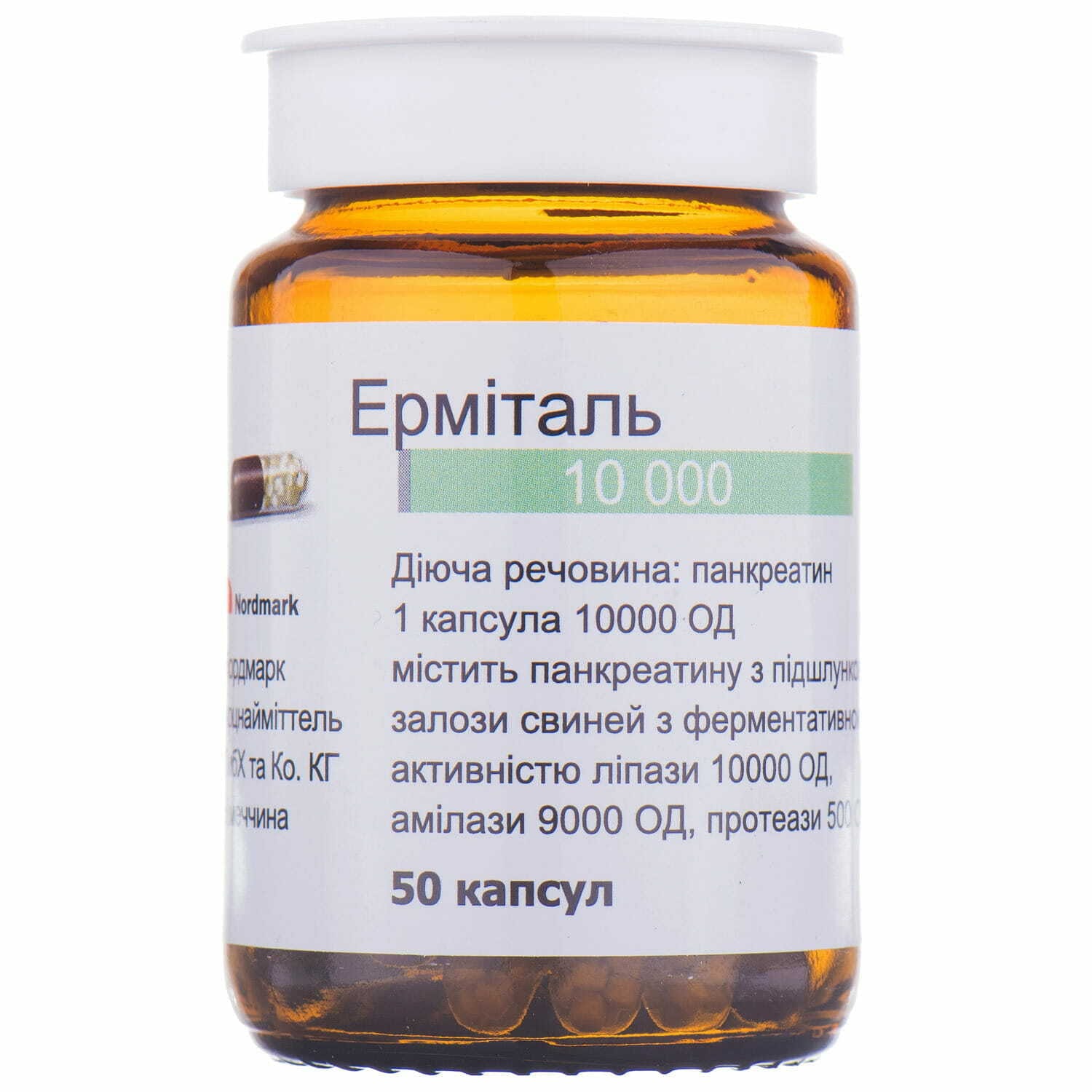
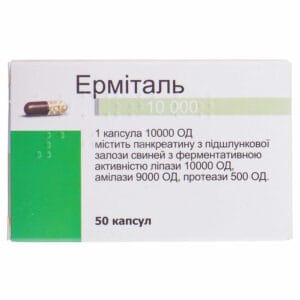
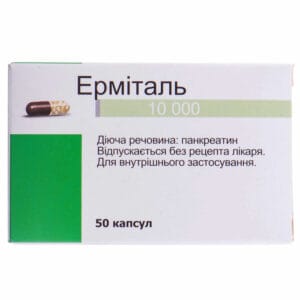
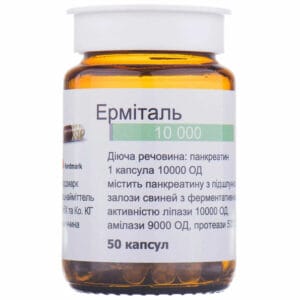
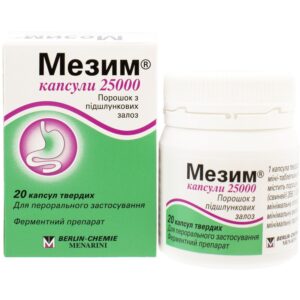

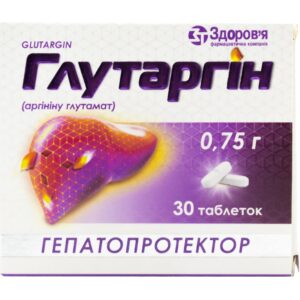

Reviews
There are no reviews yet.